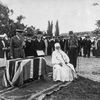Fimmtudagur, 18. febrúar 2010
Um Gengis Khan
 Ég gat ekki hćtt ađ lesa 29. kafla bókarinnar "Muhammad and the Course of Islám" í gćrkvöldi áđur en ég fór ađ sofa. Hann fjallađi um Gengis Khan og hans eftirmenn og hvernig ţeir héldu innreiđ sína inn í islamska heimsveldiđ. Hér fyrir neđan hef ég vitnađ í byrjun ţessa kafla sem segir frá ţví hvernig Gengis Khan hefndi dauđa erindreka sinna og kaupmanna úr ríki sínu sem soldáninn 'Alái'd-Dín Muhammad og landstjóri hans létu myrđa.
Ég gat ekki hćtt ađ lesa 29. kafla bókarinnar "Muhammad and the Course of Islám" í gćrkvöldi áđur en ég fór ađ sofa. Hann fjallađi um Gengis Khan og hans eftirmenn og hvernig ţeir héldu innreiđ sína inn í islamska heimsveldiđ. Hér fyrir neđan hef ég vitnađ í byrjun ţessa kafla sem segir frá ţví hvernig Gengis Khan hefndi dauđa erindreka sinna og kaupmanna úr ríki sínu sem soldáninn 'Alái'd-Dín Muhammad og landstjóri hans létu myrđa.
Islám at Bay
Timujin, the son of a petty Mongol chieftain, was a boy in his early teens when his father died. For many years he had to fight to secure his patrimony; but he achieved even more, for he united the tribes of Mongolia under his own rule. In the year 1206, by general acclaim, Timujin took the name and title of Chingiz Khan.[1] Next, he set about extending his empire eastwards, and eventually conquered northern China.[2] By then (1215), he was nearly fifty years of age -- he was born in 1167 -- and had been campaigning since the age of thirteen. To his west lay the empire of the kings of Kharazm -- the Kharazmshahs.
[1 Variously written in English as Jenghiz and Genghiz, it means the Perfect Warrior.]
[2 The Chin Empire. The Sung Empire of southern China was overrun in 1279, during the reign of the famous Qubilay Qa'an (Kubla Khan).]
At one time in Transoxania, the Qarakhata'i or the Gurkhaniyyih kingdom, together with the smaller principality of the Al-i- Khaqan or the Al-i-Afrasiyab (based on Samarqand) formed buffer states which separated the territory of Chingiz Khan from the domains of the Kharazmshahs. Their Turkish rulers were renowned for their justice and patronage of learning and poetry, but Sultan 'Alai'd-Din Muhammad, the Kharazmshah, wantonly destroyed them. Thus his frontiers became contiguous with the frontiers of the Mongols.
Chingiz Khan apprised Sultan 'Alai'd-Din Muhammad of the fact that he had overrun China, and was now a mighty and powerful ruler; but he was weary of warfare and wanted to be at peace with his western neighbour. He hoped that trade between his people and those of Kharazm would flourish. Though somewhat riled that Chingiz Khan had addressed him as his son, 'Alai'd-Din Muhammad responded appropriately to this expression of good will. However, when four Muslim traders from Mongolia arrived at Utrar, a frontier town, its avaricious governor, coveting their riches, accused them of espionage, threw them into prison, robbed them of their possessions and, to compound his felony, put them to death. Chingiz was naturally furious, but he kept calm and sent a deputation to the court of the Kharazmshah to obtain redress. The arrogant Sultan Muhammad responded stupidly and abominably by executing the head of the deputation and sending back the rest to Chingiz Khan with their beards shaved off. Chingiz moved quickly to avenge the blood of innocent people and the insult so grotesquely rendered to his own person. His Mongol hordes descended mercilessly upon the realm of Islam.
The first to taste the wrath of Chingiz was the governor of Utrar, who had murdered harmless merchants for the love of silver and gold. Molten silver was poured down his throat.“
(H.M. Balyuzi, Muhammad and the Course of Islam, p. 329 - 331)
Síđan fóru Gengis Khan og eftirmenn hans um landsvćđiđ og slátruđu milljónum manna. Nú skil ég betur af hverju ţeir atburđir hafa markađ svo djúp spor í sögu Írans, Íraks og Afganistan. Sagnfrćđingar telja ađ hátt í tvćr milljónir manna hafi látiđ lífiđ í kjölfariđ.
Meginflokkur: Vísindi og frćđi | Aukaflokkar: Bćkur, Trúmál, Bloggar | Breytt s.d. kl. 14:00 | Facebook

 Brosveitan - Pétur Reynisson
Brosveitan - Pétur Reynisson
 Börkur Gunnarsson
Börkur Gunnarsson
 Egill Bjarnason
Egill Bjarnason
 Einar Sveinbjörnsson
Einar Sveinbjörnsson
 Fladdi
Fladdi
 Guðsteinn Haukur Barkarson
Guðsteinn Haukur Barkarson
 Hrafnhildur Ýr Vilbertsdóttir
Hrafnhildur Ýr Vilbertsdóttir
 Hrannar Baldursson
Hrannar Baldursson
 Hreiðar Eiríksson
Hreiðar Eiríksson
 Hugrún Jónsdóttir
Hugrún Jónsdóttir
 Kári Harðarson
Kári Harðarson
 Kristín M. Jóhannsdóttir
Kristín M. Jóhannsdóttir
 leyla
leyla
 Mama G
Mama G
 Mofi
Mofi
 Rósa Harðardóttir
Rósa Harðardóttir
 Salvör Kristjana Gissurardóttir
Salvör Kristjana Gissurardóttir
 Sigurður Ingi Ásgeirsson
Sigurður Ingi Ásgeirsson
 Sigurjón Sveinsson
Sigurjón Sveinsson
 Vilberg Helgason
Vilberg Helgason
 Þarfagreinir
Þarfagreinir
 Þór Sigurðsson
Þór Sigurðsson










Bćta viđ athugasemd [Innskráning]
Ekki er lengur hćgt ađ skrifa athugasemdir viđ fćrsluna, ţar sem tímamörk á athugasemdir eru liđin.